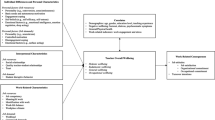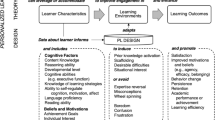Abstract
Students (N = 1,883) from 10 European countries answered a web questionnaire pertaining to three dimensions of what they expect and what they experience from their teachers. The dimensions were personality, classroom environment, and teaching style characteristics. Parametric statistics identified high communalities among variables, while gender, program type, and program level were found to have an influence on factor groupings. Overall, the gap between the expected xand the experienced proved to be overwhelmingly significant.
Similar content being viewed by others
References
Abrami, P. C., d’Apollonia, S., & Cohen, P. A. (1990). The validity of student ratings of instruction. What we know and what we don’t know. Journal of Educational Psychology, 82, 219–231.
Abrami, P. C., d’Appollonia, S., & Rosenfield, S. (1997). The dimensionality of student rating of instruction: What we know and what we do not. In J. C. Smart (Ed.), Higher education: Handbook on theory and research (Vol. 2, pp. 321–359). New York: Agathon Press.
Addison, W. E., Best, J., & Warrington, J. D. (2006). Student perceptions of course difficulty and their ratings of the instructor. College Student Journal, 40(2), 409–416.
Aleamoni, L. M. (1999). Student rating myths versus research facts from 1924 to 1998. Journal of Personnel Evaluation in Education, 13, 153–166.
Algozzine, B., Beattie, J., Bray, M., Flowers, C., Gretes, J., Howley, L., et al. (2004). Student evaluations of college teaching: A practice in search of principles. College Teaching, 52(4), 134–138.
Baldwin, T., & Blattner, N. (2003). Guarding against potential bias in student evaluations: What every faculty member needs to know. College Teaching, 51(1), 27–32.
Ben-Chaim, D., & Zoller, U. (2001). Self-perception versus students’ perception of teachers’ personal style in college science and mathematics courses. Research in Science Education, 31, 437–454.
Beran, T., Violato, C., & Kline, D. (2007). What’s the “use” of student ratings of instruction for administrators? One university’s experience. Canadian Journal of Higher Education, 37(1), 27–43.
Berk, R. A. (2005). Survey of 12 strategies to measure teaching effectiveness. International Journal of Teaching and Learning in Higher Education, 17(1), 48–62.
Brodie, D. A. (1998). Do students report that easy professors are excellent teachers? Canadian Journal of Higher Education, 28(1), 1–20.
Centra, J. A. (2003). Will teachers receive higher student evaluations by giving higher grades and less course work? Research in Higher Education, 44(5), 495–518.
Cothran, D. J., Kulinnab, P. H., & Garrahy, D. A. (2002). “This is kind of giving a secret away …”: Students’ perspectives on effective class management. Teaching and Teacher Education, 19, 435–444.
Cramer, K. M., & Alexitch, L. R. (2000). Student evaluations of college teaching: Identifying sources of bias. Canadian Journal of Higher Education, 30(2), 143–164.
D’Apollonia, S., & Abrami, P. C. (1997). Navigating student ratings of instruction. American Psychologist, 52(11), 1198–1208.
Feldman, K. A. (1976). Students’ views of the superior teacher. Research in Higher Education, 5(3), 243–288.
Feldman, K. A. (1983). The perceived instructional effectiveness of college teachers as related to evaluations they receive from students. Research in Higher Education, 18(1), 103–124.
Feldman, K. A. (1986). The perceived instructional effectiveness of college teachers as related to their personality and attitudinal characteristics: A review and synthesis. Research in Higher Education, 24(2), 139–213.
Fisher, D. L., & Kent, B. K. (1998). Associations between teacher personality and classroom environment. Journal of Classroom Interaction, 33, 5–13.
Forsyth, D. F. (2001). The Professor’s guide to teaching: Psychological principles and practices. Washington, DC: American Psychological Association.
Greenwald, A. G., & Gillmore, G. M. (1997). Grading leniency is a removable contaminant of student ratings. American Psychologist, 52, 1209–1217.
Kher, N., Molstad, S., & Donahue, R. (1999). Using humor in the college classroom to enhance teaching effectiveness in “dread courses”. College Student Journal, 33(3), 400–406.
Lynch, D. J. (2007). I’ve studied so hard for this course, but don’t get it!: Differences between student and faculty perceptions. College Student Journal, 41(1), 22–24.
Malikow, M. (2007). Professors’ irritating behaviour study. College Student Journal, 41(1), 25–33.
Marsh, H. W., & Dunkin, M. J. (1997). Students’ evaluations of university teaching: A multidimensional perspective. In R. P. Perry & J. C. Smart (Eds.), Effective teaching in higher education: Research and practice (pp. 241–320). New York: Agathon Press.
Marsh, H. W., & Roche, L. A. (1997). Making students’ evaluations of teaching effectiveness effective. American Psychologist, 52(11), 1187–1197.
Moos, R. H. (1979). Evaluating educational environments: Procedures, measures, findings and policy implications. San Francisco: Jossey-Bass.
Murray, H. G., Rushton, J. P., & Paunonen, S. V. (1990). Teacher personality traits and student instructional ratings in six types of university courses. Journal of Educational Psychology, 82, 250–261.
Naftulin, D. H., Ware, J. E., & Donnelly, F. A. (1973). The Doctor Fox lecture: A paradigm of educational seduction. Journal of Medical Education, 48(July), 630–635.
Okapala, C. O., & Ellis, R. R. (2005). The perceptions of college students on teacher quality: A focus on teacher qualifications. Education, 126(2), 374–383.
Renaud, R. D., & Murray, H. G. (1996). Aging, personality, and teaching effectiveness in academic psychologists. Research in Higher Education, 37, 323–340.
Seldin, P. (1980). Successful faculty evaluation programs: A practical guide to improve faculty performance and promotion/tenure decision. Crugers: Coventry Press.
Seldin, P. (2006). Evaluating faculty performance: A practical guide to assessing teaching, research, and service. Boston: Anker.
Torok, S. E., McMorris, R. F., & Lin, W.-C. (2004). Is humor an appreciated teaching tool? Perceptions of professors’ teaching styles and use of humor. College Teaching, 52(1), 14–20.
Wierstra, R. A., Kanselaar, G., van der Linden, J. L., & Lodewijks, H. C. (1999). Learning environment perceptions of European university students. Learning Environments Research, 2(1), 79–98.
Young, S., & Shaw, D. G. (1999). Profiles of effective college and university teachers. Journal of Higher Education, 70(6), 670–686.
Zhang, L. (2004). Do university students’ thinking styles matter in their preferred teaching approaches? Journal of Psychology, 37, 1551–1564.
Zhang, L., Huang, J., & Zhang L. (2005). Preferences in teaching styles among Hong Kong and US university students. Journal of Psychology, 39, 1319–1331.
Author information
Authors and Affiliations
Corresponding author
Rights and permissions
About this article
Cite this article
Bélanger, C.H., Longden, B. The Effective Teacher’s Characteristics as Perceived by Students. Tert Educ Manag 15, 323–340 (2009). https://doi.org/10.1080/13583880903335456
Published:
Issue Date:
DOI: https://doi.org/10.1080/13583880903335456




